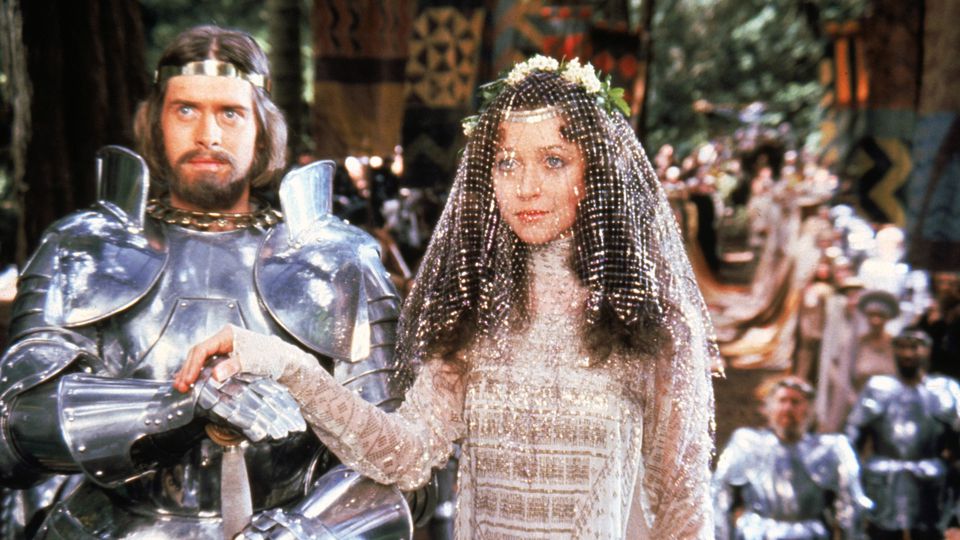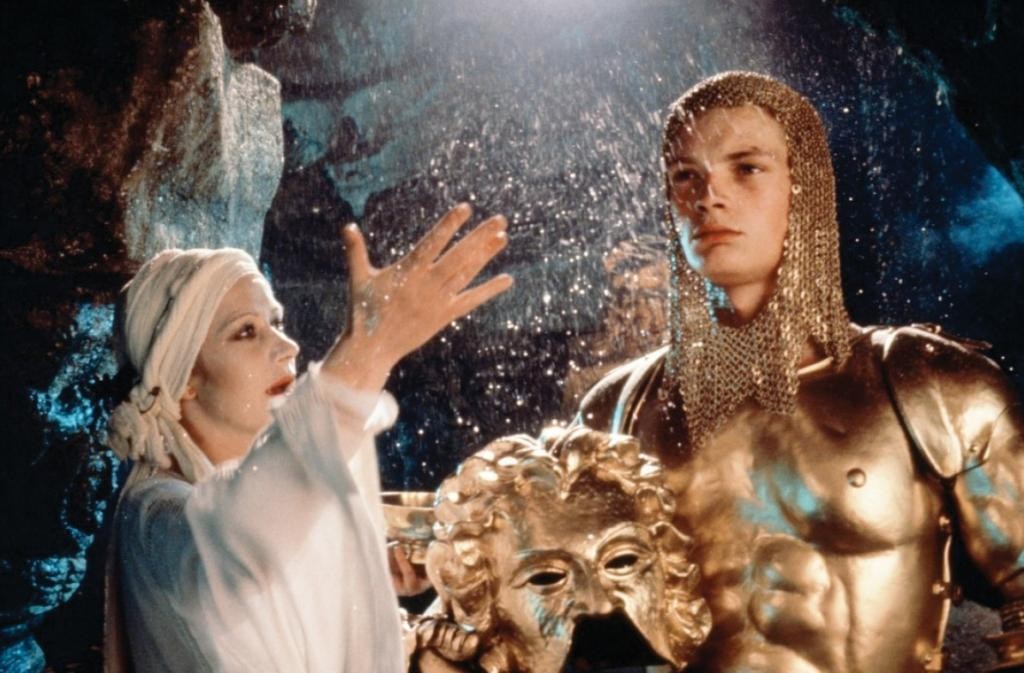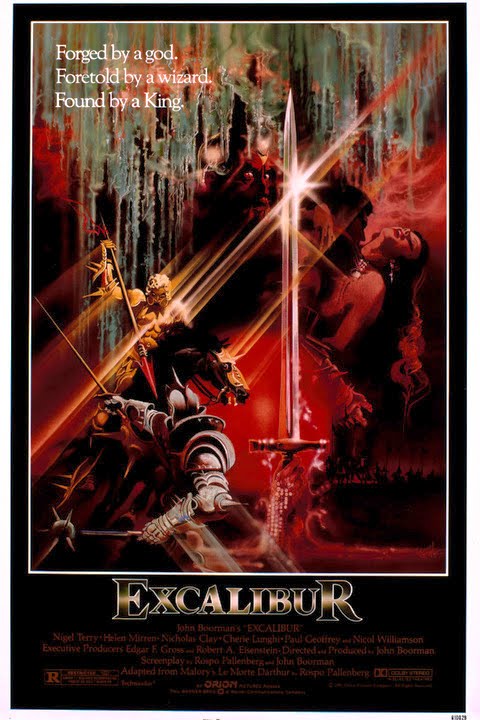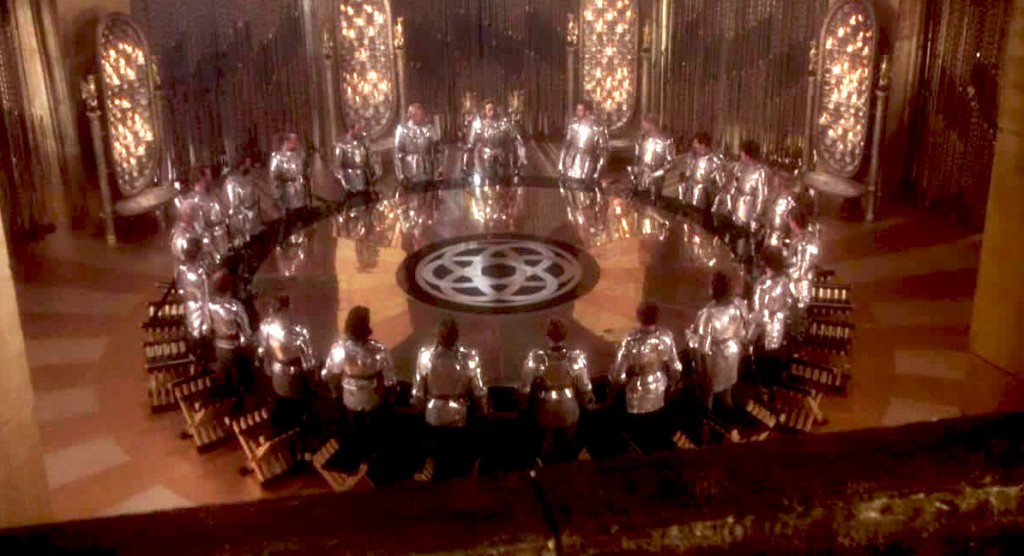Big Worlds On Small Screens & “Fantasy Films From the Eighties That Weren’t That Bad” — Rebecca Fisher Discusses “Excalibur”
~ by Rebecca Fisher
I’m sure that John Boorman’s ambitious attempt to adapt all the Arthurian legends into a single cinematic spectacle did not deliberately include capturing the aesthetic of the Eighties in all its glory – but it totally did.
As such, Excalibur is set in the Eighties version of the Dark Ages, complete with perms for the women, mullets for the men, and lots of massive jewellery and florescent eyeshadow. Because of the sheer volume of material it has to cover (and it covers nearly sixty years’ worth of story) any degree of character nuance has to be obliterated in favour of plot, making it a “cliff notes” version of the legends.
With this emphasis on story over character, the film is divided into five distinct parts: the first deals with Uther’s pursuit of Igraine, the second the Sword in the Stone and Arthur’s attempts to prove himself as king, the third Lancelot and Guenevere’s love affair, the fourth Perceval’s quest for the Holy Grail, and the fifth Arthur’s rejuvenation and the battle of Camlann.
 The wedding of Arthur and Guenevere
The wedding of Arthur and Guenevere
Strewn throughout are the staple parts of Arthurian Romances: Merlin fostering Arthur to Sir Ector, the Lady of the Lake granting Arthur Excalibur, the formation of the Knights of the Round Table, Morgana and Arthur’s incestuous liaison, Guinevere and Lancelot’s infidelity, shiny armour, mysterious castles, crotchety bridge-keepers, and knights that lose their minds at the drop of a hat.
Some of the creative choices in merging characters and relying on potent imagery to get the point across are pretty clever. Here the sorceress Morgana is combined with Morgause (the original mother of Mordred) and Nimue (who traps Merlin in the crystal cave) in order to simplify matters, and the state of Arthur’s kingdom is usually signified by how shiny the armour is – and trust me, that armour can get pretty damn shiny. We’re talking a blinding mirror-quality level sheen here.
There are a lot of familiar (albeit youthful) faces: Helen Mirren as Morgana, Patrick Stewart as Leondegrance, Liam Neeson as Gawaine and Gabriel Byrne as Uther, though in regards to the performances, it’s largely Nicol Williamson as Merlin who’s the standout.
Despite the huge swathes of material it has to cover, it’s to Boorman’s credit that the film remains coherent. There are stirring speeches and incredible set pieces – but is it the quintessential retelling of the Arthurian legends?
In my opinion: no. But only because it’s virtually impossible to fully capture the depth and scope of the Arthurian legends in their entirety. Most other adaptations chose only one chapter of Arthur’s life to dramatize: Disney’s The Sword in the Stone explores his youth, while Jerry Zucker’s First Knight dealt with the Arthur/Guinevere/Lancelot love triangle.
 Morgana prepares her son Mordred for battle (plus proof that George Clooney’s Batman was not the first to have armoured nipples).
Morgana prepares her son Mordred for battle (plus proof that George Clooney’s Batman was not the first to have armoured nipples).
Perhaps one day someone will do the entirety of the Arthurian cycle justice – though I expect when that happens it’ll be an episodic television event so as to give itself time and space to delve into all of the myriad legends. Until then, Excalibur remains a flawed but interesting contraction of a story that has been retold countless times before, and has yet to be told countless more.
Next Time:
We veer away from the strict “fantasy” genre to explore what can more generously be categorized as “speculative fiction” – starting with Terry Gilliam’s time-travelling comedy/adventure: Time Bandits.
.
About The Reviewer:
 Rebecca Fisher is a graduate of the University of Canterbury with a Masters degree in English Literature, mainly, she claims, because she was able to get away with writing her thesis on C.S. Lewis and Philip Pullman. She is a reviewer for FantasyLiterature.com, a large website that specializes in fantasy and science-fiction novels, as well as posting reviews to Amazon.com and her They’re All Fictional blog.
Rebecca Fisher is a graduate of the University of Canterbury with a Masters degree in English Literature, mainly, she claims, because she was able to get away with writing her thesis on C.S. Lewis and Philip Pullman. She is a reviewer for FantasyLiterature.com, a large website that specializes in fantasy and science-fiction novels, as well as posting reviews to Amazon.com and her They’re All Fictional blog.
To read Rebecca’s detailed introduction of both herself and the series, as well as preceding reviews, click on:
Big Worlds On Small Screens
Rebecca won the 2015 Sir Julius Vogel Award for Best Fan Writer, for writing that included Big Worlds On Small Screens.









